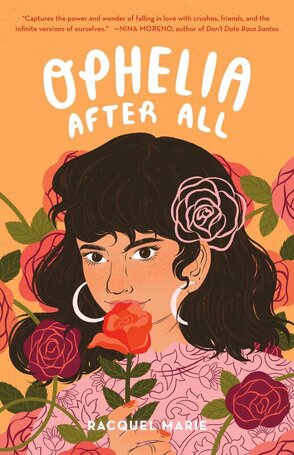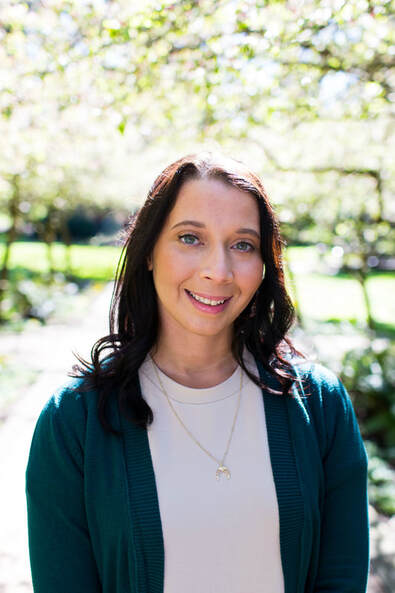|
Las Musas is celebrating the release of Racquel Marie’s debut young adult novel, OPHELIA AFTER ALL! Today, fellow Musa Francesca Flores interviews Racquel Marie about the themes and characters in this novel where a teen girl navigates friendship drama, the end of high school, and discovering her queerness. OPHELIA AFTER ALL has been praised as “A feel-good and effortlessly inclusive coming-of-age story that deftly captures the aching tension of queer adolescence,” (Kirkus Reviews) and “A memorable, boundary-breaking story about identity, friendship, and the messy complications between the two,” (Mark Oshiro, author of ANGER IS A GIFT).  More on OPHELIA AFTER ALL: Ophelia Rojas knows what she likes: her best friends, Cuban food, rose-gardening, and boys - way too many boys. Her friends and parents make fun of her endless stream of crushes, but Ophelia is a romantic at heart. She couldn't change, even if she wanted to. So when she finds herself thinking more about cute, quiet Talia Sanchez than the loss of a perfect prom with her ex-boyfriend, seeds of doubt take root in Ophelia's firm image of herself. Add to that the impending end of high school and the fracturing of her once-solid friend group, and things are spiraling a little out of control. But the course of love--and sexuality--never did run smooth. As her secrets begin to unravel, Ophelia must make a choice between clinging to the fantasy version of herself she's always imagined or upending everyone's expectations to rediscover who she really is, after all. Francesca Flores: Why was it important to you to write a character who loves having crushes and falling in love? Is there something about a romantic character’s personality that you enjoy writing? Racquel Marie: Ophelia and I definitely share that character trait, especially when I was her age. I was really interested in diving into the ways a character could end up idealizing romance and placing all of their self-worth in it, while not demonizing or painting them as immature for loving love. So it was a fun challenge to play around with that balance. Ophelia goes through a big journey in learning to value platonic, familial, and self-love on the same level as romantic love, but she doesn’t lose being a romantic along the way, which felt important. Francesca Flores: Senior year is such a huge time of redefining yourself, preparing for adulthood, and of course, goodbyes to your high school life. Why did you decide to set the story during this year? Racquel Marie: Ophelia and her friends all deal with varying conflicts about their identities and futures, so setting the story at a time in their teenage lives when there’s so much pressure to have everything worked out felt appropriate. I wanted them to be teetering on that edge of adulthood, scared that any move would send them spiraling down, only to slowly realize throughout the book that we’re always on the precipice of some change and growth in life. It’s more than okay to fear that uncertainty, but there’s power in embracing it too. Francesca Flores: As someone who is queer and had my first inklings of this realization in high school, it’s a very tender time in someone’s life and can be confusing or scary. I love that you show Ophelia from the first moment she realizes she likes a girl rather than her already knowing her sexuality at the start, because it still feels like there’s so few books out there for questioning characters. How did you tackle writing it in an authentic, sensitive way that you think could help teens reading it see themselves or learn from it? Racquel Marie: Ophelia’s journey with her sexuality was heavily influenced by my own. I wanted readers to get to see the nuances and intricacies of what it’s like to suddenly recognize your queerness— seemingly out of the blue—especially since it’s often a bumpy ride in our cisheteronormative society. This meant showing the internalized homophobia, fear, confusion, and doubt alongside the emotional freedom, relief, celebration, and community that comes with being queer. Questioning teens shouldn’t feel isolated in any aspect of these experiences, so I hope seeing Ophelia navigate them too provides some comfort that they’re not alone. Francesca Flores: In what ways did you strive to make Ophelia’s friends supportive? What aspects of her friend group were important for you to explore? Racquel Marie: High school friendships can be complicated in that they may be heavily reliant on the familiarity of their origins. Ophelia recognizes that some of her friendships will change as they graduate and leave for college because they won’t all be in the same environment, doing the same daily things together anymore. Exploring this was key to the story because it adds to Ophelia’s fear of change, but it’s also something I don’t see discussed as often in YA. I love messy, flawed characters, so Ophelia and her friends make a lot of mistakes and selfish choices. At their core though, they all love and care for each other. Their friendships bend, but never break, and they show up for one another when it really counts. Francesca Flores: Are there any of your own interests that have worked their way into the book? Is gardening one of your interests, for example? Racquel Marie: I wish I was as skilled a botanist as Ophelia, but I’ve barely managed to keep a pothos plant alive after years of constantly killing succulents. Ophelia and her mother’s love of literature and literary theory, however, definitely comes from me. All of the texts referenced in the book are actually ones I was studying in college at the time of writing Ophelia After All! If I came across something in a class I found interesting, into the book it went. Francesca Flores: If you could take Ophelia out in your city one day, what would you do together? Racquel Marie: It’s not very specific, but I’d love to take Ophelia to any one of the botanical gardens in Southern California. Every time I visited one over the years of writing Ophelia After All, I caught myself checking the breeds of roses and taking photos of flowers I thought she’d like, so it would be really cool to get to show her all of it for real, in person. Francesca Flores: Without spoilers, what was one of your favorite scenes to write? Racquel Marie: Argument scenes are my favorite to write on both a craft and catharsis level. Dialogue cadence is a blast for me to fine-tune and something about letting characters just verbally explode their feelings is deeply satisfying, so the two biggest argument scenes involving Ophelia and one or more of her friends were my favorite to work on. Even while I was crying lol. No spoilers beyond that! Francesca Flores: Tell us something you love about Ophelia and hope readers can take away from the story. Racquel Marie: I love that while this is a book that focuses on a hopeless romantic questioning aspects of her identity that relate to romantic attraction, this isn’t a romance book. (I adore romances and my 2023 book is a sapphic contemporary romance!) What I hope readers take away from this is that their queerness isn’t contingent on their present relationship status, and feel comforted by the message that love has value in all of its forms. Purchase OPHELIA AFTER ALL today!
0 Comments
Leave a Reply. |
Las Musas SpeakWelcome to our blog! Archives
July 2024
Categories
All
|



 RSS Feed
RSS Feed